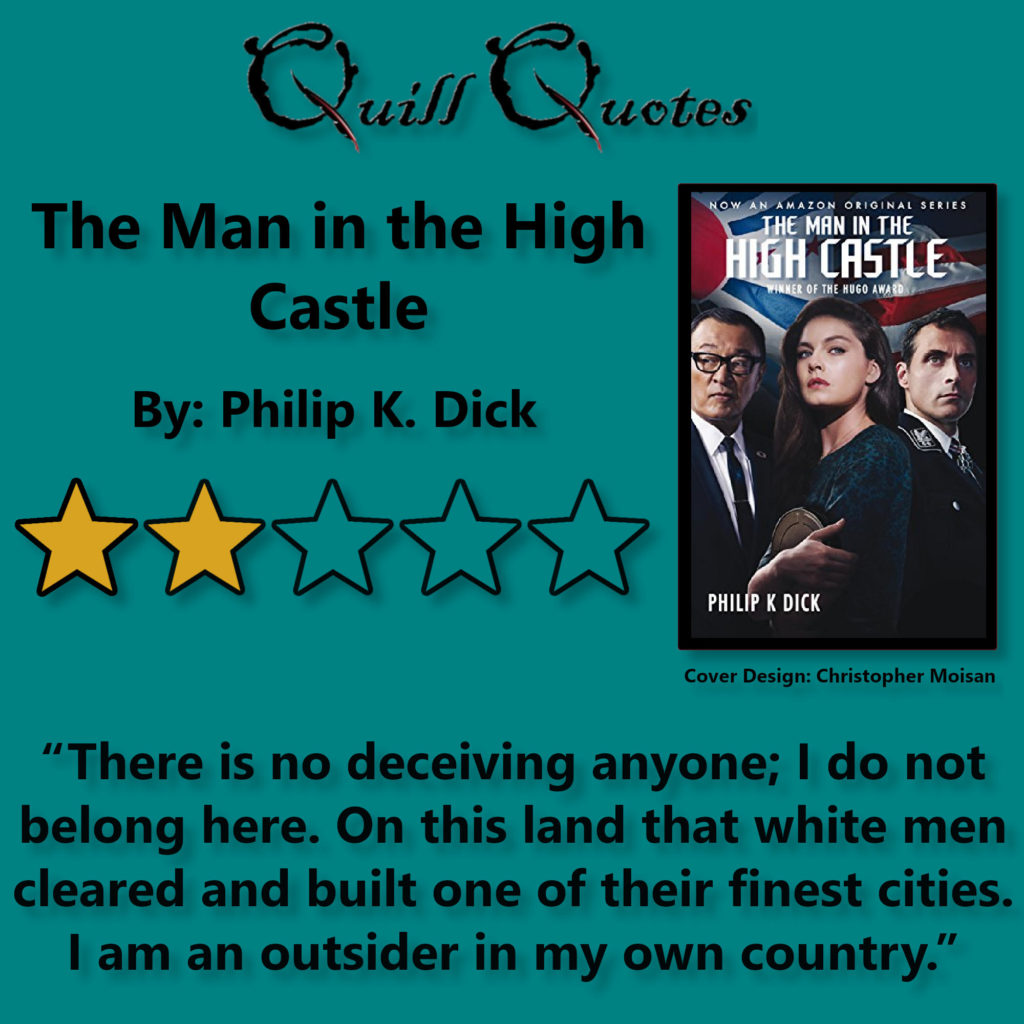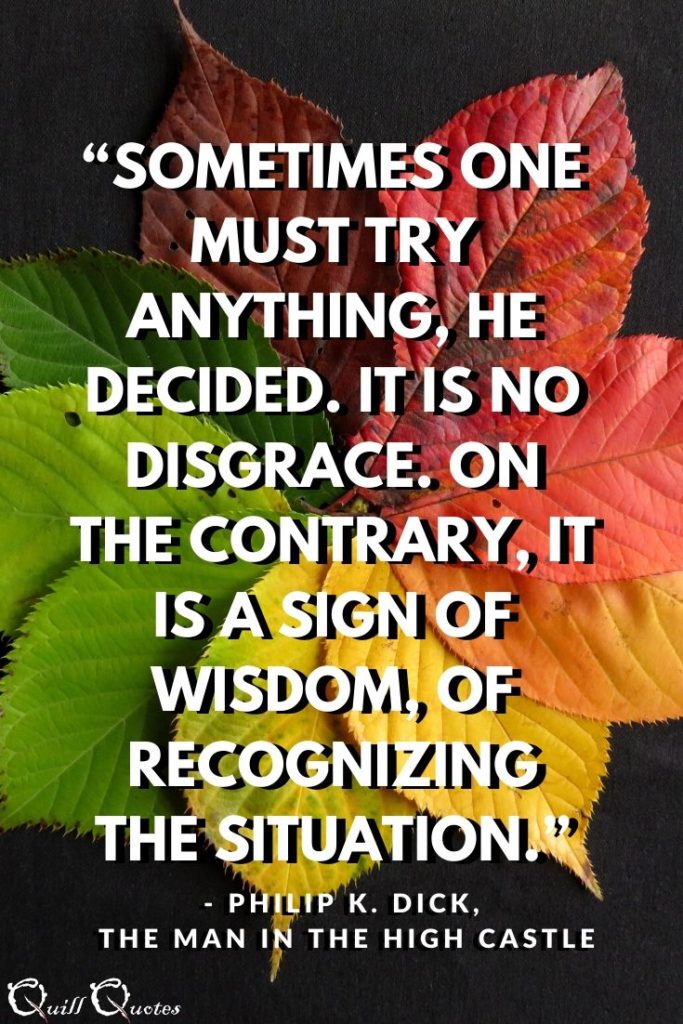I just finished reading The Man in the High Castle by Philip K. Dick in anticipation of binging the show on Amazon Prime Video now that the final season is released. While I’m still excited to watch the show, I must admit I kind of hated the book. I feel like the story is good but the book didn’t deliver on my expectations. Luckily, the book was available on Kindle Unlimited, so check there if you’re a member and still interested in reading it. It’s hard to put my feelings on this book into words, but I’ll give it a shot.

Book Stats
- Title: The Man in the High Castle
- Author: Philip K. Dick
- Genre: Science Fiction, Alternate History, Dystopia
- Publication Date: 1962
- Pages: 290
- Est. Reading Time: Approx. 10 hours
- My Rating: 2/5 Stars
- Buy Now: Amazon
The Man in the High Castle: Plot Summary
The year is 1962, the United States is under the control of Imperial Japan and Nazi Germany after the Allies lost World War II. The story predominantly takes place in San Francisco and the American West, now the Japanese-occupied Pacific States of America (PSA). Germany occupies the East, although the name United States of America is retained. Although allied during the war, tension is soon revealed between the new world superpowers, Germany and Japan.
Life in the PSA is very difficult for most Americans with the Japanese occupying all positions of authority. The few who succeed cater to the Japanese, relying on their favor to rise above others. For example, Robert Childan owns American Artistic Handcrafts, Inc., selling American antiques as collectibles to the rich Japanese officials.
“There is no deceiving anyone; I do not belong here. On this land that white men cleared and built one of their finest cities. I am an outsider in my own country.”
– Philip K. Dick, The Man in the High Castle, Robert Childan
The Grasshopper Lies Heavy
As a novel within a novel, many of the characters in the story read The Grasshopper Lies Heavy by Hawthorne Abendsen. The popular book is banned in German-controlled regions for depicting an alternate reality where the Allies won the war. Although still different from real WWII history, the book sparks many debates between characters on what would be better (or worse) had the Axis lost.
Abendsen, the author, supposedly lives in a guarded fortress in Cheyenne, Wyoming for fear of retaliation from the Nazis. Called the “High Castle”, this location gives its name to the book’s title.
Caution: Remainder of plot summary contains spoilers (click to expand)
Near the end of the book, one of the characters meets Abendsen to ask questions about The Grasshopper Lies Heavy. Here it’s revealed that the I Ching, an ancient Chinese divination text used by characters throughout the story to make decisions, was used by Abendsen to write the alternate reality. Belief in the I Ching’s readings leads to claims that the Axis losing WWII must then be the “truth”.
My Feelings on the Ending
This ending was very disappointing to me. The book pulled me in near the middle with the reveal of Germany’s Operation Dandelion plot and potential resistance groups still in operation giving the feeling we were driving to a big conclusion. However, the ending didn’t live up to those expectations at all and I felt ended abruptly. Potentially, this is because a sequel was planned but never completed.
The Man in the High Castle: My Thoughts
Although I didn’t like the book overall, the idea of a world where the Allies lost World War II is certainly thought-provoking.
Writing Style
I didn’t care for Philip K. Dick’s writing style in this book with frequent use of short, choppy, incomplete sentences. I haven’t read any of his other books so I’m not sure if it’s just his style or specific to The Man in the High Castle. Possibly, it was done to reflect the Japanese cultural impacts on America. Unfortunately, I found it very distracting and it made many of the most exciting passages difficult to follow.
Cultural Changes
Japanese impacts on American culture can be seen throughout the book. One of the biggest examples of the change in culture is the use of the I Ching, an ancient Chinese divination text, to make important decisions by many of the characters. Furthermore, the social hierarchy is dominated by the Japanese and Germans; a fact reinforced by the characters’ thoughts and actions.
“Humiliated me and my race. And I’m helpless. There’s no avenging this; we are defeated and our defeats are like this, so tenuous, so delicate, that we’re hardly able to perceive them. In fact, we have to rise a notch in our evolution to know it ever happened.”
– Philip K. Dick, The Man in the High Castle, Robert Childan
“Slavs, Poles, Puerto Ricans, were the most limited as to what they could read, do, listen to. The Anglo-Saxons had it much better; there was public education for their children, and they could go to libraries and museums and concerts.”
– Philip K. Dick, The Man in the High Castle
Meaning
The overall message seems to be that no ideal world exists, whether it’s the Axis winning WWII in The Man in the High Castle, the Allies winning in The Grasshopper Lies Heavy, or our own world and true history.
“We do not have the ideal world, such as we would like, where morality is easy because cognition is easy. Where one can do right with no effort because he can detect the obvious.”
– Philip K. Dick, The Man in the High Castle
Human nature is presented as the reason for this, which may be true, but is nevertheless quite depressing. First, in one character’s explanation of the ending to The Grasshopper Lies Heavy, and then by another in the main story.
“It works for around ten years. Then there’s trouble—naturally.” “Why naturally?” “Human nature.” Joe added, “Nature of states. Suspicion, fear, greed.”
– Philip K. Dick, The Man in the High Castle
“We are all doomed to commit acts of cruelty or violence or evil; that is our destiny, due to ancient factors. Our karma.”
– Philip K. Dick, The Man in the High Castle
Quotes
Despite my overall disappointment, there were several parts and quotes I enjoyed. See some of my favorite quotes from The Man in the High Castle below:
“It will end, Childan thought. Someday. The very idea of place. Not governed and governing, but people.”
“What profit it a man if he gain the whole world but in this enterprise lose his soul?”
“Watching him, Juliana thought, It’s idealism that makes him that bitter. Asking too much out of life. Always moving on, restless and griped.”
“Perhaps if you know you are insane then you are not insane. Or you are becoming sane, finally. Waking up.”
“It is therapeutic to meet these people who have intimidated you. And to discover what they are really like. Then the intimidation goes.”
“The Moment changes. One must be ready to change with it. Or otherwise left high and dry. Adapt. The rule of survival, he thought. Keep eye peeled regarding situation around you. Learn its demands. And—meet them. Be there at the right time doing the right thing.”
“Sometimes one must try anything, he decided. It is no disgrace. On the contrary, it is a sign of wisdom, of recognizing the situation.”
“Death at each moment, one avenue which is open to us at any point. And eventually we choose it, in spite of ourselves. Or we give up and take it deliberately.”

The Man in the High Castle: Final Thoughts
Although it wasn’t my favorite book, the storyline was certainly intriguing. There wasn’t near as much action as I expected but parts definitely got me thinking. I’m still looking forward to watching the show based on The Man in the High Castle, as I’ve heard great things. Hopefully, it’ll be one of the rare cases where the movie/show is better than the book!
Have you read The Man in the High Castle? Did you enjoy it or did you come away disappointed like me? I’d love to hear your thoughts in the comments!


OK, here I am 3 years after you posted your thoughts, to post mine. There is no doubt that the ending of the book left me feeling flat and yes, disappointed. Such is the way when I have invested my time reading a book only to be left baffled like this book left me. There were so many loose ends left dangling that I felt cheated in a way…but, how thought provoking this was! It left me to decide where the story went next. It left me to do the thinking, and after all, isn’t this what we want from a book? As exasperating as the ending was, the story has stayed with me and has given me much to contemplate. Yes, PKD was intending to write a follow up, and although he began on a number of occasions he was never satisfied with the direction he was taking and ultimately abandoned the project altogether.
This book was really an exercise for PKD to write a book being guided by the I-Ching, just as the author of “The Grasshopper Lies Heavy” did in the book itself, and as Abendsen questioned whether he actually wrote “The Grasshopper…” or he was merely a secretary transposing the book, I think that this was how PKD felt about the project and why he couldn’t bring himself to continue writing it. Like all of PKDs writings, “…High Castle” is primarily an insight into the mind of PKD at the time of writing.
There are other aspects about the book within a book, particularly the “excerpts” included, none of which carry any actual dialogue from any characters who may or may not have been a pert of the “novel”, which bring into question what type of book it actually was. As one of the characters in “…High Castle” questions the nature of “The Grasshopper…”, it’s not really science fiction because there’s no science in it. This is just one of the examples of PKD questioning his own intentions, and one of the examples of how the book is a mirror of itself.
It’s these techniques and others that make PKD the insightful and thought provoking author that he was, beyond the actual stories themselves.
Thanks, Gary, great thoughts! The book within a book would definitely be hard to write and an interesting challenge for PKD. I’m not very familiar with the I-Ching or its appeal, so that could be part of my issue following the book. It’s too bad he never finished the sequel but I’m sure it’s a tricky topic to write about and he would have wanted to get it right before publishing.
I knew it was a book, as I’ve been wanting to see the show and looked into it, it definitely sounds like an intriguing read, disappointing on the ending though and that’s a shame. Thank you for sharing your thoughts, I think I’ll have to give this a read now!
It was an intriguing read. Not too long either, so if you’re interested I’d say to go ahead and read it before watching the show! I’m interested to see how closely the show follows the book. To make 4 seasons, I’m guessing they at least had to add some new plotlines and action which I think will make it more enjoyable to me.
Thank you for sharing. I’d seen the banner of the show but never got around to finding out what it was about. Maybe I can add it to my list of shows to watch.
The show is definitely worth a look. It started a little slow but I’m liking it much more than the book so far, 3 episodes in.